#312 Is Vitamin D Good for the Heart, Longevity, and Atrial Fibrillation?
 Dr. John Day
Dr. John DayDr. Day is a cardiologist specializing in heart rhythm abnormalities at St. Mark’s Hospital in Salt Lake City, Utah. He graduated from Johns Hopkins Medical School and completed his residency and fellowships in cardiology and cardiac electrophysiology at Stanford University. He is the former president of the Heart Rhythm Society and the Utah chapter of the American College of Cardiology. |

Podcast: Play in new window | Download
Subscribe: RSS
Is Vitamin D Good for the Heart, Longevity, and Atrial Fibrillation?
My answer to is vitamin D good for the heart, longevity, and atrial fibrillation is changing based on the most recent studies. While low vitamin D levels are definitely associated with heart attacks, heart failure, atrial fibrillation, longevity, cancer, infections, premature death, dementia, etc. it is becoming increasingly clear that taking a vitamin D supplement may not decrease the risk of any of these bad things happening. So what do the latest studies say and should we still take a vitamin D supplement for low vitamin D levels? Read on to learn more.
The Vital Trial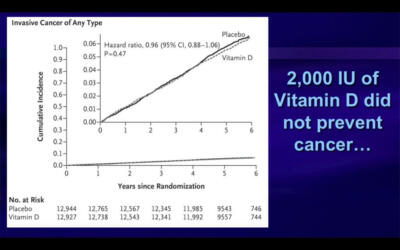
The main findings of the Vital Trial were published in 2019. This was a randomized controlled trial (RCT) which is the highest
quality study you can do. It was also published in the most prestigious medical journal, The New England Journal of Medicine.
The Vital Trial enrolled 12,987 patients and through a complex randomization process specifically evaluated whether taking 2,000 IU of vitamin D or a placebo could prevent cancer, heart attacks, strokes, or a cardiac death. To get into the Vital Trial you had to be age 50 or older if male and 55 or older if female. The reason why they picked an older age group is that at these ages the risk of heart disease and cancer start really going up.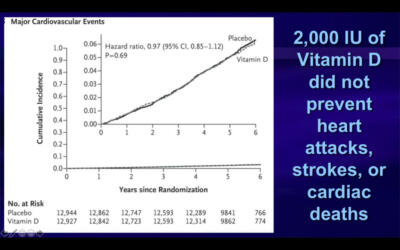
As you might suspect, for those randomized to 2,000 IU of vitamin D, their 25-hydroxyvitamin D levels did somewhat increase from 29.8 ng/mL to 41.8 ng/mL. For those not familiar with 25-hydroxyvitamin D levels, normal is 30 to 100 ng/mL. With this in mind, you can see that the people studied didn’t really have that low of vitamin D levels, to begin with. Regardless, researchers then following these 12,987 patients for the next 5.3 years to see if this slight increase in vitamin D levels could prevent cancer, heart attacks, strokes, or a cardiac death.
Sadly, 2,000 IU of vitamin D daily did none of the above. There was no statistical difference in the number of cancers, heart attacks, strokes, or cardiac deaths between the vitamin D supplement group and the placebo group. And a just-published sub-study from the Vital Trial also showed that a 2,000 IU vitamin D supplement did nothing to prevent atrial fibrillation. Surprisingly, even in the group with super low vitamin D levels (less than 20 ng/mL) a daily vitamin D supplement still didn’t prevent atrial fibrillation.
Vital Trial and Atrial Fibrillation Risk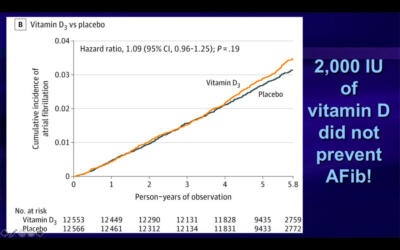
So what did all these millions of dollars spent on this study really teach us? Well, we learned that even though low vitamin D levels have been shown to be associated with an increased risk of atrial fibrillation, a supplement doesn’t seem to fix anything.
Of course, one could argue that only increasing 25-hydroxyvitamin D levels from 29.8 to 41.8 ng/mL is simply not enough to make a difference in arrhythmias. And it’s certainly possible that many episodes of atrial fibrillation during the 5 plus years of follow-up were probably missed as these people were not continuously monitored for arrhythmias. And given that the mean age of this study was 67, one could also argue that the results may not apply to younger patients.
Our 2011 Vitamin D Atrial Fibrillation Study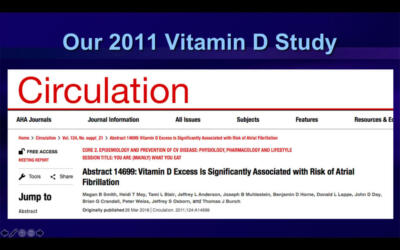
When trying to assess the results of the atrial fibrillation Vital Trial, I have to put in a plug for our 2011 vitamin D atrial fibrillation study. In this study, we looked at the impact of vitamin D on 132,000 patients within the Intermountain Healthcare system in Utah and Idaho.
In our study, the average age was 52 and 71% of the patients were women (as opposed to the 50/50 male-female mix in the Vital Trial). One finding of our study was that there was a trend toward low vitamin D levels being associated with atrial fibrillation (14% increased risk that didn’t quite reach statistical significance). However, the key finding of our study was that over-supplementation with vitamin D, driving 25-hydroxyvitamin D levels above 100 ng/mL, was associated with a statistically significant 2.5x increased risk of atrial fibrillation.
Dr. Day’s 7 Thoughts on Vitamin D
1. Vitamin D supplements probably won’t help you avoid heart problems or cancer. Vitamin D supplements also probably won’t make you live any longer.
2. Vitamin D supplements aren’t benign as we showed in our study above. Driving 25-hydroxyvitamin D levels above the normal range could result in atrial fibrillation, hypercalcemia (too much calcium in your blood), kidney failure, bone loss, and hardening of your heart and arteries.
3. While vitamin D supplements don’t protect the heart, studies suggest that natural sunlight and spending time outside regularly may protect your heart. Of course, if you’re going to get vitamin D naturally then do it in a sun-smart way so that you don’t get skin cancer in the process.
4. While low vitamin D levels are associated with just about every bad medical condition, we still don’t know if low vitamin D causes these conditions or rather these if these medical conditions cause vitamin D levels to drop.
5. I personally still take 2,000 IU of vitamin D each day. The reason is that I have had my vitamin D levels tested and my levels consistently run low without supplementation. One reason for my low vitamin D levels could be due to the minimal dairy and fish I consume. It could also be due to the fact that living in the Salt Lake City area, I can only get vitamin D naturally about half of the year.
6. Even though vitamin D supplements don’t seem to help the heart or cancer prevention, low vitamin D levels can result in frequent infections, fatigue, bone or back pain, depression, poor wound healing, bone loss, hair loss, or muscle pain. Anecdotally, I noticed that since I started supplementing with vitamin D 10 plus years ago, I rarely if ever get sick. Of course, not ever getting sick could also be due to all of the positive lifestyle changes I made in my life at about the same time that we described in our book, The Longevity Plan.
7. If you choose to supplement with vitamin D, only do so under the direction of a healthcare provider. Vitamin D levels must be tracked if you supplement to prevent complications.
Is Natural Vitamin D Best?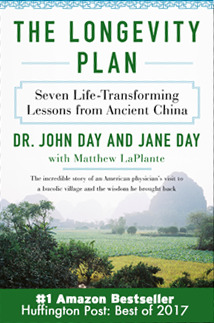
Given that vitamin D supplements don’t seem to help the heart or cancer, could it be that the Vital Trial studied the wrong way to boost vitamin D levels? Indeed, given all of the studies reporting better heart health and longevity from the natural forms of vitamin D, like spending time outdoors, we need a big randomized clinical trial looking at the natural vitamin D supplements.
In our best-selling book, The Longevity Plan, we reported the results of our 5-year study of the centenarians living in China’s longevity belt in the rural mountainous areas near the Vietnam border. While these centenarians did not take any supplements or consume any dairy, they did eat some fish and spent most of the day outside. Indeed, they enjoyed year-round vitamin D while they hand farmed every day.
Interestingly, while some centenarian studies have reported that centenarians enjoyed high normal levels of vitamin D, many of the centenarians in rural China had low vitamin D levels. Contradictory results like these tell us that we still have a lot to learn when it comes to vitamin D and longevity.
Disclaimer
The information provided in this blog article is for general informational purposes only. Please work closely with your healthcare provider on monitoring and managing any potential vitamin D abnormalities you may have.
About the Photo
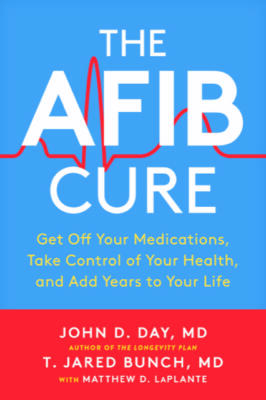
Also, if you liked the photo attached to this article, it is a picture I took of a moose just outside of my office window in Park City, Utah.

Disclaimer Policy: This website is intended to give general information and does not provide medical advice. This website does not create a doctor-patient relationship between you and Dr. John Day. If you have a medical problem, immediately contact your healthcare provider. Information on this website is not intended to diagnose or treat any condition. Dr. John Day is not responsible for any losses, damages or claims that may result from your medical decisions.


Great advice on vitamin D!!!
My wife and I have been taking 5000 IU of vitamin D for probably five years or more. 12 months ago, both of us had Covid and we both had mild symptoms. We just tested for covid
antibodies and the results were that we both still have measurable antibodies 12 months after infection.
When I had my bout with Covid, I went to the ER because my oxygen level dropped to the low 90s. They gave me a shot of dexamethasone and convinced me to spend one night for observation, which I did not want to do. The next morning, my O2 level was back in the high 90s and I was discharged. The internist attending to me told me that most of his Covid patients had low vitamin D levels along with obesity and diabetes. I have none of those conditions and he said that’s probably why I had no trouble with Covid.
So, I can’t say for sure, but since my vitamin D levels are up around 80 and I keep a good weight and eat very little sugar or carbs, maybe that allowed me to survive Covid with no problems.
Now, if the CDC would just recognize natural immunity as the best immunity for Covid, many of the 100 million+ Americans that have had covid & have natural immunity would stop being harassed by all of the idiots that know nothing about science and keep telling us that we still need to be vaccinated. Aaargh!!
John, I believe that your age and pre-existing conditions should factor into anyone’s decision on whether to get the shot or not. The side effects of getting the shot are so minimal for 99.9% of the people that and just makes sence.
Vitamin D is not very effective if you are magnesium deficient. Life Extension Magazine, July 2021.
About vitamin D. It is the sunshine vitamin. I live in Wisconsin it is too cold to go out in the sun half of the year. I take vitamin D and Zinc. These two make my immune system stronger. Most people in Wisconsin are short of vitamin D. My son who lives with me got
Covid 19. I did not catch it from him I was not yet vaccinated at the time.
I am 83 years old and have had diabetes for 30 years. I manage it with diet and 20 units of long acting insulin. I have none of the conditions that accompany diabetes. I don’t eat fat free anything.
I add fat to my diet. It doesn’t raise blood sugar and keeps hunger at bay. I also add ground flax seed to my food to increase fiber
as fiber doesn’t raise blood sugar either. 30 years ago when I was diagnosed with diabetes I weighted 205 lbs. I am 5’4″ tall. I took
off the weight and kept it off for over 30 years.
I have never eaten processed food and don’t eat food that I didn’t
cook myself. Sugar, flour potatoes and rice are the killers for diabetes. I don’t eat them. My thyglycerides are less than half
what is considered normal. That is with added fat in my diet. What you have been told about food is not correct.